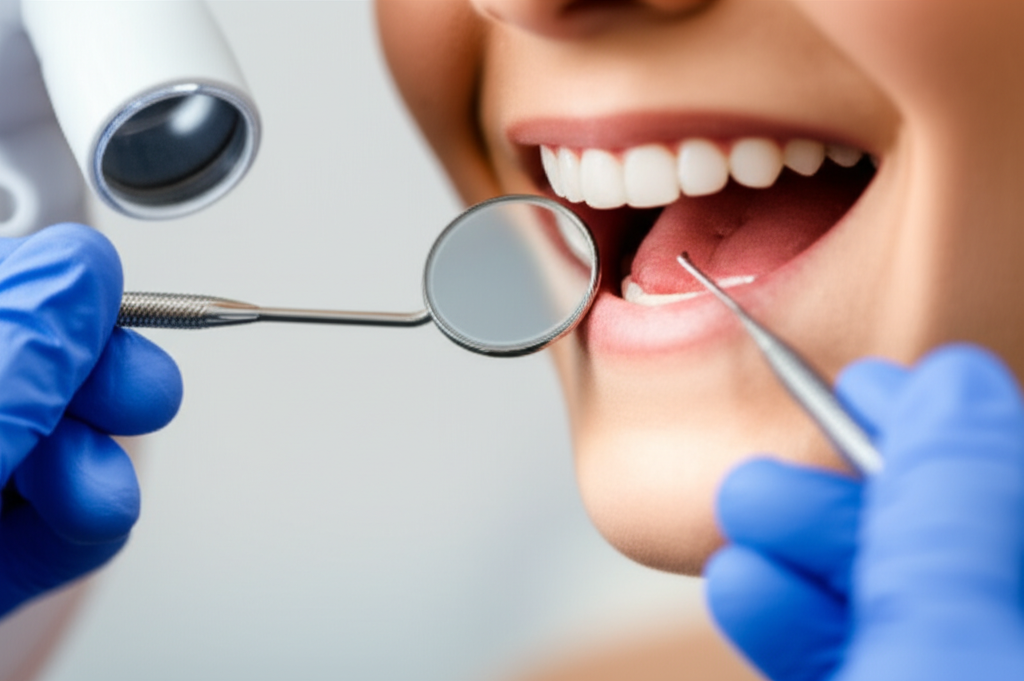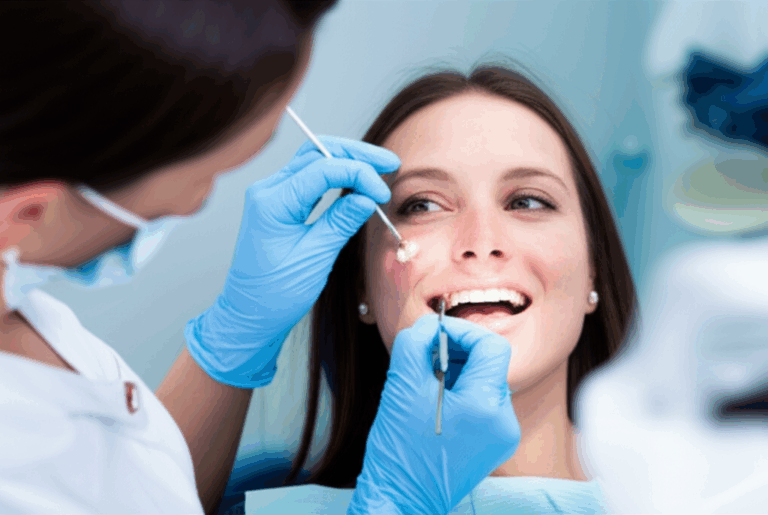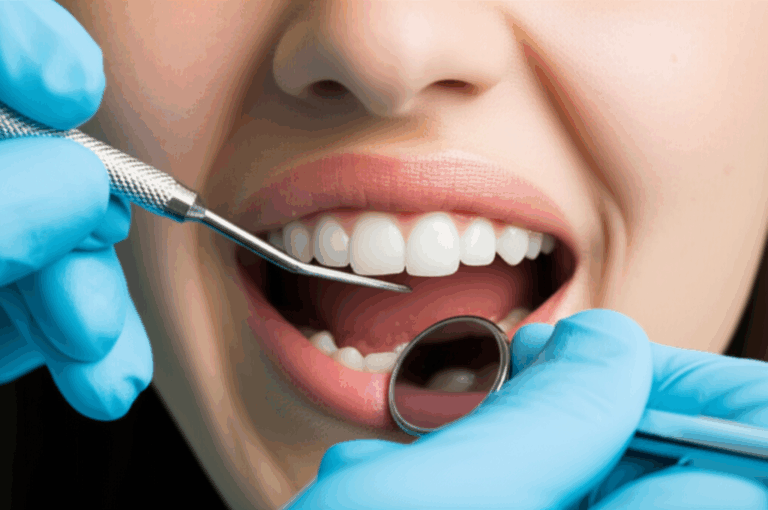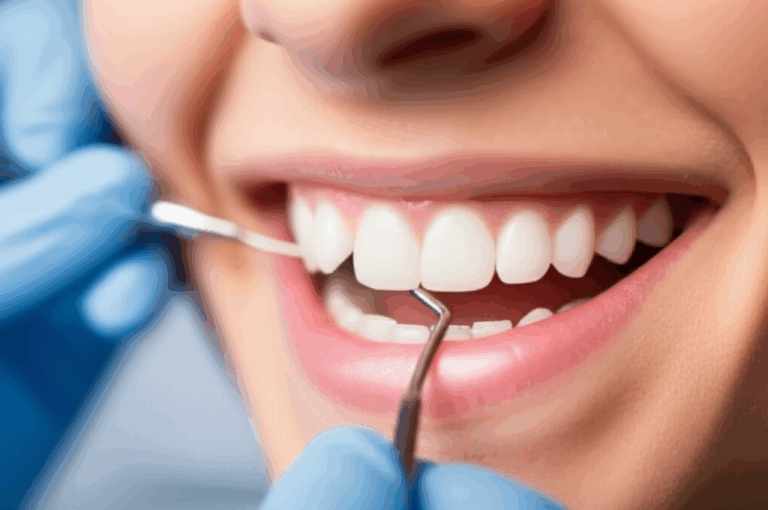
Can a Dentist Fix a Chipped Tooth in One Day? Your Easy Guide
A chipped tooth can happen really fast—maybe you bit into a hard apple, or you tripped and hit your mouth. You see your tooth isn’t smooth anymore, maybe it hurts, and you think, “Can a dentist fix this right away?” Good news: Most of the time, you can walk in with a chipped tooth and walk out with your smile looking good on the same day. This article will show you step-by-step how fixing a chipped tooth works, what the dentist might do, and what you should do right now to protect your teeth. Let’s get started. Your happy smile is worth it!
Table of Contents
What Happens When You Chip a Tooth?
I’ll never forget the first time I chipped a tooth. I was eating popcorn, bit down hard, and—crack! Suddenly there was a rough edge on my front tooth. Most chips don’t hurt right away, but sometimes your tooth will feel sensitive or sharp to your tongue.
So, what actually happens? Your enamel (the tough outside part) can crack, chip, or break. Sometimes, just a tiny part goes missing. Other times, the break shows the yellow inside, or even the nerve. Not every chip looks the same: some are small, while others are big and painful. Learn more about tooth anatomy here.
Words you might hear when you chip a tooth:
- Enamel: The hard, shiny shell that keeps your teeth safe.
- Dentin: The yellow part just under your enamel.
- Pulp: The soft middle that holds tiny blood vessels and nerves.
- Cusp: The pointed part, usually on your back teeth.
Is a Chipped Tooth an Emergency?
Let’s be clear: sometimes a chipped tooth is the kind of thing you should have fixed as soon as you can. Other times, you can wait a day or two.
When you need help fast:
- There’s a lot of pain
- The tooth is bleeding
- You see pink or red inside the tooth (that’s the pulp)
- A big piece broke off
- The chip is on a front tooth, and you really want your smile back
If you say “yes” to any of these, contact an emergency dentist right away. You don’t want things to get worse, and you don’t want to get an infection. Even if your chip is small, it’s smart to have it checked. Chips can turn into cracks quickly, and cracks can become broken teeth and tooth infections.
Can a Dentist Really Fix My Chipped Tooth in One Day?
You might be thinking, “Can this be fixed now, or do I have to wait weeks?” I understand. No one wants to walk around with a chipped tooth showing.
Dentists have modern tools and materials to fix most chips in just one visit. In fact, almost 90% of small to medium chips can be fixed right then with dental bonding or tooth reshaping. For bigger chips or broken parts, things like same-day crowns can save you from coming back.
Here’s a quick look:
| Type of Chip | Same-Day Repair? | Best Treatment |
|---|---|---|
| Small chip | Yes | Dental bonding, reshaping |
| Bigger chip | Often | Same-day crown |
| Big break | Sometimes no | More steps needed |
So, yes—a dentist can often fix your chipped tooth in one day, especially if you go to a dentist with new tools and a fast digital dental lab.
What Are the Fastest Ways to Fix a Chipped Tooth?
Let’s talk about how dentists fix chips so fast. Here are the most common ways:
1. Dental Bonding (Composite Resin)
- Quick and not too expensive
- The dentist puts a tooth-colored material on your tooth and shapes it
- Looks like your real tooth
2. Tooth Reshaping/Contouring
- The dentist files down sharp or rough spots
- No new material—just smoothing out the chip
- Best for tiny chips
3. Same-Day Crowns (CEREC/CAD/CAM)
- Good for big chips or cracked back teeth
- A camera takes pictures of your tooth and a machine makes a crown right there
- The crown covers and protects the broken tooth
Each fix has its own cost and how long it lasts, and we’ll talk more about that soon. Not sure which one is right? That’s why your dentist will check your tooth and maybe take X-rays at your appointment.
How Do Dental Bonding and Composite Repair Work?
Think of the chip on your tooth like a tear in your favorite shirt. Don’t you want a fix that looks just like it did before?
Dental bonding can do that. Here’s what happens:
The cool part? The resin is colored to look just like your teeth. Most of the time it takes only 30-60 minutes and you can use the tooth right away (but try not to eat hard things at first).
Why dental bonding is good:
- Fast—done in one visit
- Cheaper than crowns or veneers ($100-$600 per tooth)
- No need to grind down healthy tooth parts
- Lasts up to 10 years if you’re careful
Downsides:
- Not as strong as a crown
- Can stain if you drink lots of coffee or soda
For small to medium chips, bonding is a true one-day fix.
Are There Other Same-Day Solutions for Cracked or Chipped Teeth?
Sometimes a chip is just too big to fix with bonding. That’s when high-tech one-day dental crowns help, thanks to computer design and fast machines.
Same-Day Crowns (CEREC or CAD/CAM)
Let’s say your back tooth lost a big chunk or you cracked a molar while playing sports. Your dentist might use a same-day crown—a tooth cover made in the office with a special machine.
This is how it goes:
- The dentist uses a small camera to make a 3D picture of your tooth
- A machine makes a new crown from strong tooth material
- The crown is glued onto your broken tooth
This takes about 2-3 hours and is done on the same day. No need for a fake tooth while you wait, and no need to come back. Really cool, right?
If you want a super strong and real-looking fix, ask your dentist about strong crowns like Emax or zirconia. If you want to know more about how dentists make these things so fast, check out what a dental ceramics lab can do.
When Can’t a Dentist Fix Your Tooth in One Visit?
Some tooth chips are just too hard to fix right away. Here’s when things can take longer:
- Deep Damage: If the chip goes deep and you can see or feel the nerve, you might need a root canal. This can take more than one visit.
- Complicated Breaks: If the tooth split up and down or in a few pieces, a regular fix isn’t enough.
- Waiting for Lab Work: Regular crowns or fancy tooth covers made outside the office can take days or weeks. If your dentist doesn’t have a same-day crown machine, you’ll wear a temporary tooth while you wait.
Some cases need special dentists. An endodontist looks after nerve problems. If the tooth broke below the gum, you might need a mouth surgeon.
But even if the fix can’t be finished that day, your dentist will almost always give you a quick, temporary fix to help with comfort and to keep your tooth safe.
What Should I Expect During My Dental Visit?
Here’s a simple idea of what happens if you chip a tooth and go to the dentist.
If you feel nervous, let your dentist know. They want you to feel comfortable and safe.
How Much Does it Cost to Fix a Chipped Tooth?
Let’s talk money. Here’s what you might pay:
| Treatment | Average Cost per Tooth | Insurance Cover? |
|---|---|---|
| Bonding | $100-$600 | Most of the time yes |
| Same-day crown | $800-$2,500 | Most of the time yes |
| Veneers | $900-$2,500 | Sometimes (not always) |
| Tooth reshaping | $50-$200 | Rarely covered |
What can change the price:
- How big your chip is
- Which tooth is hurt (front teeth may cost more)
- Where you live and your dentist’s skill
- What type of repair your tooth needs
Dental insurance often pays for chipped tooth fixes if you need it from an accident or for your health. If you only want it to look better, they might not help. Ask the dental office to check for you.
How Can I Protect My Teeth from Chipping Again?
No one can say you’ll never chip a tooth, but you can make it much less likely. Try these ideas:
If you keep your teeth healthy and visit the dentist, you won’t need many chipped tooth repairs in the future—but if you ever do, you now know what to do!
Summary: What You Absolutely Need to Know
- Most chipped teeth can be fixed in one day with new dental ways like bonding and same-day crowns.
- Going to the dentist fast stops pain and bigger problems.
- Dental bonding is quick, not too expensive, and looks great for small chips.
- Big chips may need crowns, and lots of dentists can make crowns the same day.
- Really bad breaks might need more, but dentists always give you a quick fix to help right away.
- It can cost from under $100 for easy repairs to over $2,000 for crowns.
- Keep your teeth safe with mouthguards, good habits, and checking in with the dentist.
- Don’t wait—seeing a dentist soon is the best thing you can do for a chipped tooth.
Frequently Asked Questions
Q: Is a chipped tooth dangerous?
A: Sometimes. Not fixing a chip can turn into a crack, an infection, or worse. If you see pink inside the tooth, have a lot of pain, or can’t eat, that’s an emergency.
Q: How long does dental bonding last?
A: With good care, bonding can last 5-10 years. Don’t bite hard stuff and try not to drink too many drinks that stain.
Q: Who fixes chipped teeth?
A: Regular dentists fix most chips. For tough cases, your dentist might work with a crown and bridge expert for good results.
Q: Will my tooth look normal again?
A: Yes! Dentists match the fix to your tooth color. Most people can’t even see the repair when it’s done.
Q: Can kids get chipped teeth fixed?
A: For sure. Kid dentists fix chips with safe materials and gentle care.
Remember: Don’t worry if you chip your tooth. Most of the time, the dentist can make your smile good as new in a single day—and you can leave ready to show your smile again. If you want to know more about fast, same-day fixes and how dental labs help, take a look at advanced repairs from a china dental lab.








